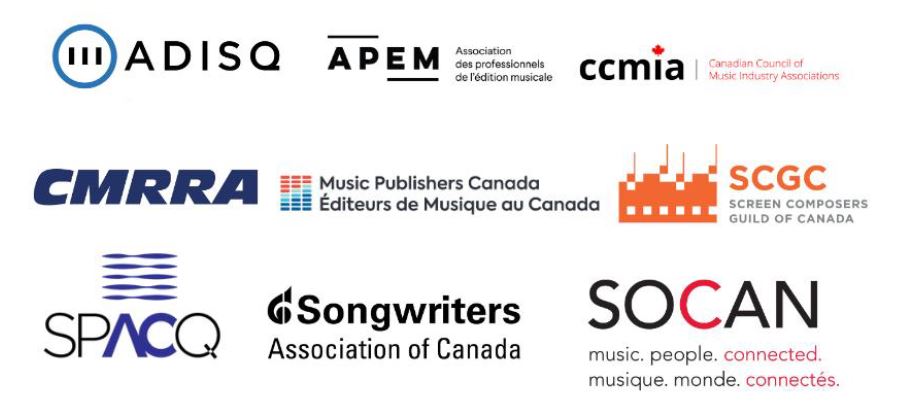
We represent Canada’s songwriters, composers, and music publishers as well as the organizations that support them, including the signatories listed above, known collectively as “ACCORD”. Together, ACCORD represents over 185,000 Anglophone and Francophone songwriters, composers and music publishers as our members.
We write to address the emergence of generative artificial intelligence (AI) systems and the potential disruptions it presents for the Canadian music industry. We acknowledge the consultation on AI and copyright launched by your departments and thank you for your attention on this matter. ACCORD supports a regulatory and copyright policy framework that respects creators and values and incentivizes human expression. While AI has the potential to support and enhance the valuable work of human creators, it must not replace human creativity and culture.
Our specific concerns about the impact of AI on the Canadian music industry include the following:
- The use of massive numbers of pre-existing creative works exploited by AI models without the consent of creators or their representatives, and a lack of transparency about, among other things, how the developers of AI systems source and use those works.
- The risk that AI systems will diminish the demand and respect for the work of human creators and the impoverishing effect this would have on creative industries and, ultimately, Canadian culture.
- The risk of AI systems being used to imitate creators’ voices and likenesses without their knowledge or consent.
It is important to preserve the balance and policy goals of the Copyright Act, which include fostering and rewarding human creativity and enabling creators and their representatives to control how their works are used, by whom, and on what terms.
We therefore urge the federal government to adopt the following principles as part of any regulatory or policy framework for AI:
- Protect human expression: Copyright is designed to protect and reward the value of human expression. Any proposal that weakens or conflicts with this objective should be rejected.
- No new copyright exceptions: There should be no new copyright exceptions that would permit AI developers to use creators’ works without permission to develop AI models or create content with AI.
- Transparency: AI developers must be transparent about the specific works exploited by an AI model and how the works were sourced and used. Creators must be able to identify whether their works have been used.
- AI Labelling: Canadians should know whether they are listening to music created by a human or generated by AI. Developers of AI models should be required to implement a method to identify or detect AI-generated content, and the music industry should be encouraged to adopt a labelling standard to identify AI-generated music. That standard could build on existing identifiers, such as explicit content labels.
- Licensing: AI developers must obtain permission from creators or their representatives before using their intellectual property or personality rights, including their voices and likeness.
We recognize that AI systems present certain opportunities for the music industry. Many of the organizations signing this letter are already exploring the use of AI to assist in our businesses. It is important to find ways for AI systems and human expression to co-exist for the benefit of all stakeholders, including the Canadian public. We believe the principles outlined above establish the foundation for an effective process.
Sincerely,
Association québécoise de l’industrie du disque, du spectacle et de la vidéo (ADISQ)
Association des professionnels de l’édition musicale (APEM)
Canadian Council of Music Industry Associations (CCMIA)
Canadian Mechanical Reproduction Rights Agency (CMRRA)
Music Publishers Canada (MPC)
Songwriters Association of Canada (SAC)
Screen Composers Guild of Canada (SCGC)
Society of Composers, Authors, and Music Publishers of Canada (SOCAN)
Société professionnelle des auteurs et des compositeurs du Québec (SPACQ)


